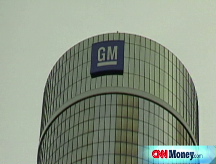GM shares end at 33-year low
The automaker's stock price plummets nearly 11% after Goldman cuts stock to 'sell.'
NEW YORK (CNNMoney.com) -- General Motors stock price fell almost 11% Thursday, to the lowest level in more than 33 years, as analysts reacted to a Goldman Sachs downgrade and continued concerns about the automaker's competitiveness.
GM (GM, Fortune 500) shares ended down $1.38, or 10.8%, to $11.43, after hitting an intraday low of $11.21.
That was the lowest price for GM shares since Dec. 24, 1974, when shares traded at $11.16, according to the Center for Research in Security Prices at the University of Chicago The price has been adjusted for splits and other price- affecting distributions.
The selloff followed a report issued Thursday by Goldman Sachs downgrading the automaker to "Sell" from "Neutral." Analysts lowered their six-month price target for GM to $11 from $19.
"We expect GM shares to continue to under perform as market fundamentals deteriorate which exacerbates liquidity concerns," the report states. "We think GM's automotive cash flow burn this year and next is likely to lead it to look to raise capital, which we believe could lead to significant shareholder dilution and/or a cut to the company's dividend."
In the first half of the year, General Motors faced strong headwinds in the market because its product line included mostly trucks and sport-utility vehicles, which consumers have increasingly abandoned in the face of high gas prices, said Tom Libby, an analyst with Power Information Network, an automotive research company.
He said the automaker also has faced increasing material costs and high labor costs, representing an additional hurdle when competing with Asian manufacturers on price.
"Their market share is under pressure now, and it will be for the rest of the year," Libby added.
It will take months for GM to restructure its factories to produce the smaller cars that have experienced increased demand, said Libby.
It will also take over a year for GM to realize the cost savings of the recently negotiated contract with the United Auto Workers Union, said David Cole, chairman of the Center for Automotive Research.
"The big question is whether they have enough cash to make it from here to there," Cole said. "It is going to be tough, and it depends on the economy. Once they start to realize their labor savings, we may see profits increase like we have never seen from GM." ![]()


